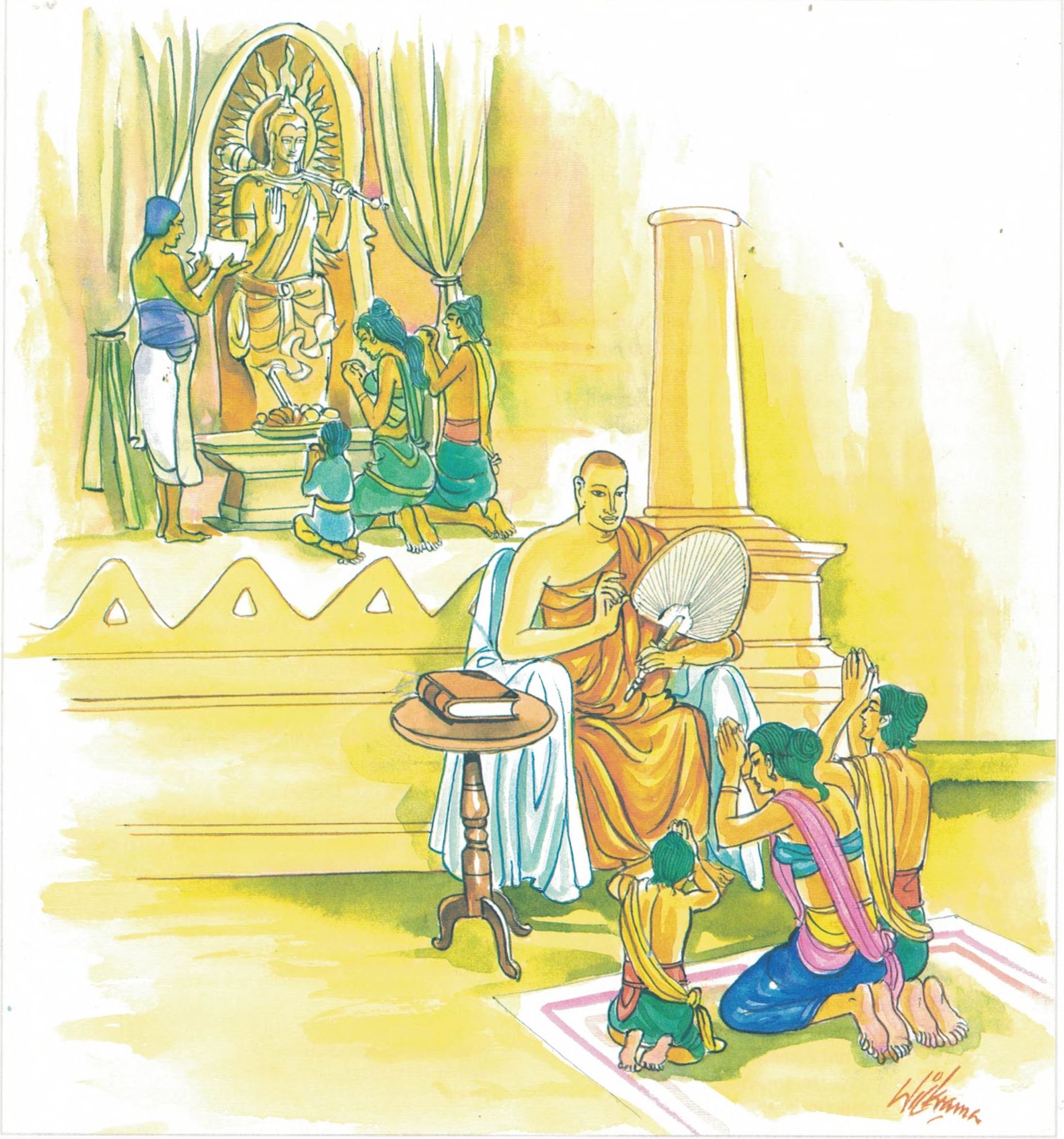Dhammapada (Illustrated)
by Ven. Weagoda Sarada Maha Thero | 1993 | 341,201 words | ISBN-10: 9810049382 | ISBN-13: 9789810049386
This page describes The Story of Bahiyadaruciriya which is verse 101 of the English translation of the Dhammapada which forms a part of the Sutta Pitaka of the Buddhist canon of literature. Presenting the fundamental basics of the Buddhist way of life, the Dhammapada is a collection of 423 stanzas. This verse 101 is part of the Sahassa Vagga (Thousands) and the moral of the story is “One meaningful stanza which leads to calm is better than a thousand empty ones”.
Verse 101 - The Story of Bāhiyadārucīriya
Pali text, illustration and English translation of Dhammapada verse 101:
sahassampi ce gāthā antthapadasaṃhitā |
ekaṃ gāthāpadaṃ seyyā yaṃ sutvā upasammati || 101 ||
101. Though a thousand verses be composed of meaningless lines, better the single line of verse one hears, then comes to calm.
 One meaningful stanza which leads to calm is better than a thousand empty ones. |
The Story of Bāhiyadārucīriya
While residing at the Jetavana Monastery, the Buddha spoke this verse, with reference to Bāhiyadārucīriya.
A group of merchants went out to sea in a boat; their boat was wrecked at sea and all, except one, died. The only survivor got hold of a plank and eventually came to land at the port of Suppāraka. As he was naked, he tied a piece of bark to his body, got hold of a bowl, and sat in a place where people could see him. Passers-by gave him rice and gruel; some thought that he was a holy man and paid respects to him. Some brought clothes for him to wear but he refused, fearing that by wearing clothes, people would give less respect to him. Besides, because some said that he was an arahat, he mistakenly came to think that he really was one. Thus, because he was a man of wrong views who was wearing a piece of bark as his clothing, he came to be known as Bāhiyadārucīriya. Mahābrahma came to him in the night and said to him, “Bāhiya, you are not an arahat yet, and what is more, you do not have the qualities that make one an arahat.” Bāhiya looked up at Mahābrahma and said, “Yes, I must admit that I am not an arahat, as you have said. I now realize that I have done a great wrong. But is there anyone else in this world now who is an arahat (a perfected person)?” Mahābrahma then told him that there lived in Sāvatthi a Teacher, Gotama Buddha, an arahat, who was perfectly self-enlightened.
Bāhiya found the Buddha going on an alms-round with other monks and respectfully followed him. He pleaded with the Buddha to teach him the Dhamma, but the Buddha replied that since they were on an alms-round it was not yet time for a religious discourse. And again, Bāhiya pleaded, “Venerable, one cannot know the danger to your life or to my life, so please talk to me about the Dhamma.” The Buddha knew that Bāhiya had made the journey of one hundred and twenty yojanas in one night, and also that he was overwhelmed with joy at seeing the Buddha. That was why the Buddha did not want to talk about the Dhamma immediately but wanted him to calm down to enable him to take in the Dhamma properly. Still, Bāhiya persistently pleaded. So, while standing on the road, the Buddha said to Bāhiya, “Bāhiya, when you see an object, be conscious of just the visible object; when you hear a sound, be conscious of just the sound; when you smell or taste or touch something, be conscious of just the smell, the taste or the touch; and when you think of anything, be conscious of just the mind-object.”
After hearing the above discourse, Bāhiya attained arahatship and he asked permission from the Buddha to join the Sangha. The Buddha told him to get the robes, the bowl and other requisites of a monk. On his way to get them, he was gored to death by a cow which was, in fact, a female evil spirit in the likeness of a cow. When the Buddha and the other monks came out after having had their meal, they found Bāhiya lying dead on a rubbish heap. As instructed by the Buddha, the monks cremated the body of Bāhiya and had his bones enshrined in a stūpa. Back at the Jetavana Monastery, the Buddha told the monks that Bāhiya had realized Nibbāna. He also told them that as far as speed was concerned in attaining Magga Insight (abhiññā) Bāhiya was the fastest, the best (etadaggaṃ). The monks were puzzled by the statement made by the Buddha and they asked him why and when Bāhiya became an Arahat. To this, the Buddha replied, “Bāhiya attained arahatship while he listened to my instructions given to him on the road when we were on the alms-round.” The monks wondered how one could attain arahatship after listening to just a few sentences of the Dhamma. So, the Buddha told them that the number of words or the length of a speech did not matter if it was beneficial to someone.
Explanatory Translation (Verse 101)
anatthapadasaṃhitā gāthā ce sahassaṃ api
yaṃ sutvā upasammati ekaṃ gāthāpadaṃ seyyo
anatthapadasaṃhitā: full of meaningless expressions; gāthā: stanzas; ce: even; sahassaṃ api: thousands (are not worth); yaṃ: which if, sutvā: by hearing; upasammati: a person is pacified; ekaṃ gāthāpadaṃ [gāthāpada]: only one such meaningful stanza; seyyo [seyya]: is noble
A poem replete with thousands of verses is of no value if it has no useful meaning. One single stanza pregnant with wisdom is more valuable, if hearing it one is pacified.
Commentary and exegetical material (Verse 101)
gāthā: verse; stanza. A Pāli composition in verse, usually of four lines.
